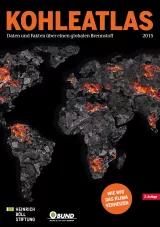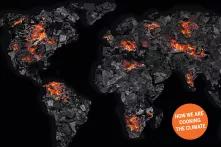European Energy Policy
A major part of the programme “Europe for Citizens” the Heinrich Böll Foundation is realizing in 2015 is the engagement with energy policy. One of the main topics in the focus is the fossile ressource coal. One quarter of Germanys carbon emmissions are produced by 30 big coal plants alone. The hunger for coal is big – especially in the industrialized countries. This in an enormous thread for the health of both citizens and environment. The "Kohle-Atlas", a publication in form of an atlas, provides the national and international dimensions of coal-based power generation in a very illustrative way. It shows how coal-mining effects climate and health, the economy of the costs, real and apparent ressource alternatives as well as instruments and conditions of a phase-out. Beside the publication, which is avalaible as download or in printed form with many graphics, the Heinich Böll Foundation will release a study later this year, that will focus on the impacts of coal energy.
Another key aspect of the activities in the field of energy policy is the German Energiewende. More and more the discussion about it expands to a debate about the European Energiewende. There are many ideas to a European Energy Union on the table already. How the path towards a united energy market could like is discussed in many articles of the foundations European blogs and in various events held in the European offices.
Events
SEYN ACADEMY 2.0
Chania, Crete, Greece
27. September – 3. October 2015
SEYN wants to actively contribute to a fossil-fuel free era and lead positive social change through youth empowerment and their inclusion in the European and global energy decision-making. SEYN Crete academy follows the SEYN Solta Academy both aiming to detect common ground between different practices in a variety of European countries and want to increase Europe-wide participation of young people in the creation of new community-rooted initiatives. With a unique curriculum that has been developed through collaboration with experts from green/renewable energy sector, SEYN Crete Academy wants to ensure participants get quality education and training in renewable energy and apply this to the transition to a clean energy future. One of the academy aims is to build a network of young people from different European countries engaged in community renewable energy to document good practice, share experiences and create support/solidarity networks. After taking part in the academy, participants will get a chance to mobilize their peers in the community around different forms of collaboration on sustainable energy, primarily in building up local cooperatives. They will become active SEYN members and promoters, and through innovative actions will assist in decreasing greenhouse gas emissions and investments in dirty industries.
Blogs
Energy@Transition
year-round – Brussels, Belgium
Germany has drawn a lot of international attention for its aim to switch to a renewable energy economy and leave nuclear and fossil energy behind. A lot of the international reporting about the German Energy Transition, or Energiewende, has, however, been misleading – for instance, when it comes to the role of coal power, energy price trends, competitiveness and carbon emissions. The website "Energy@Transition" aims to explain what the Energiewende is, how it works, and what challenges lay ahead. It is intended to provide facts and explain the politics and policies to an international audience. The website highlights the effects of the Energiewende on the German economy, environment and society and addresses the most important related questions. All the texts and graphs are under Creative Commons License (CC BY SA) with the aim to make this information available to the public. Feedback is welcome the contributers encourage their readers to comment and discuss the German Energiewende with them.
The blog started already in 2013 – beeing very successfull, it will be continued in 2015.
Publications and Web Dossiers
The “2015 Coal Atlas” published on June 2nd, 2015, illustrates the devastating effects of coal power. It calls on the EU to stand up to energy corporations and phase out of the fossil resource. The Coal Atlas also informs about human rights violations, prooving the security measures and working conditions of coal extraction in opencast mines are unacceptable. Despite its harmful CO2 emmissions and dramatic impacts on health and environment the Europe-wide coal industry recieves huge sums of tax money – almost €10 billion – abroad and in the EU itself.
Initiative "Our Space"
Initiative „Our Space": Take Your Chances – Create your Living Space!
Website, Workshops, Campaign, Lobbying
From February until November 2015 – Banja Luka, Bosnia and Herzegovina
The initiative "Our Space" („Naš prostor“) was developed as a reaction to the current, very dissatisfying condition and management of public spaces in Banja Luka. Especially alarming was the recent trend in urban development to use green spaces within the urban center for construction projects which was resulting in the fact that they were not usable for citizens any more. If this trend continues, these activities will lead to a dramatic reduction of functional public spaces. Furthermore an increasing number of existing green spaces is degenerating and not managed properly. The living standards will decrease as well as the rights to a liveable environment, recreational spaces and holiday areas will be diminished. Citizens will also loose possibilities to have social interactions in qualitative urban spaces.
The website "Our Space" provides an interactive map with easy-to-understand, illustrativly produced information of the planned usage of all green spaces in and around the city of Banja Luka. It helps citizens to understand how building projects impact their enviroment, empowers them to take action and how to get actively involved in creating a more liveable and green environment.
EU Policy
Faith in the European project is on the wane, as many are unable to recognise the advantages of a consolidated EU – in spite of the fact that they are plain to see, for example regarding a common energy, foreign, and security policy. Through events and studies we aim to foster debates about the future of the EU, and we would like to keep the citizens up-to-date and win them over as active participants able to frame the future of the European Union.

